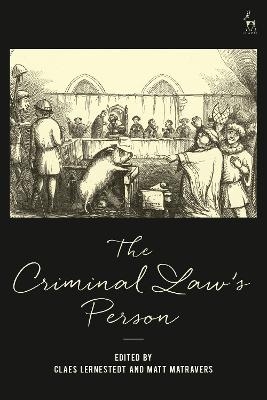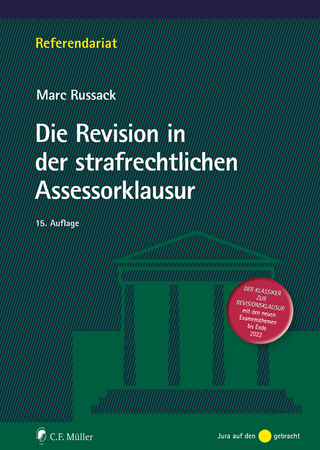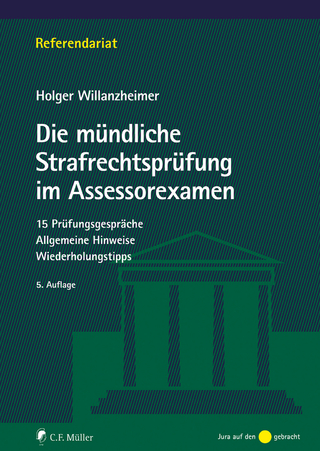
The Criminal Law’s Person
Hart Publishing (Verlag)
978-1-5099-2374-8 (ISBN)
Claes Lernestedt is Professor of Criminal Law at Stockholm University. Matt Matravers is Director of the Morrell Centre for Toleration at the University of York.
1. Introduction: The Criminal Law’s Person
Claes Lernestedt, Stockholm University, Sweden and Matt Matravers, University of York, UK
I. Criminal Justice: Political Not Metaphysical
II. The Criminal Law and the Criminal Law’s Person(s)
III. Contested Sources, Contested Purposes
IV. Outline of the Volume
2. The Criminal Law’s Various Persons
Matt Matravers, University of York, UK
I. Introduction
II. Ex Ante: Criminalisation, Policing and Prosecution
III. Ex Post: Conviction and Sentencing
IV. ‘Science’ and the Criminal Law’s Various Persons
3. The Criminal Law’s Person and Normative Elements in the Legal Definition of Excusing Circumstances
Kai Hamdorf, Federal Court of Justice, Germany
I. Introduction
II. The Presumption of Guilt in the Normative Concept of the Criminal Law’s Person
III. The Presumption of Guilt and Excusing Circumstances in Criminal Law
IV. Conclusions
4. Standard-Setting versus Tracking ‘Profound’ Blameworthiness: What should be the Role of the Rules for Ascription of Responsibility?
Claes Lernestedt, Stockholm University, Sweden
I. Introduction
II. Criminal Law Backwards and Forwards
III. What if? A Flexible within
IV. A Few Examples
V. Closing Comments: The Criminal Law and Everyday People
5. Attributability and Accountability in the Criminal Law
Robin Zheng, University of Glasgow, UK
I. Two Concepts of Responsibility
II. Two Routes to Criminal Responsibility: The Attributability Route
III. Two Routes to Criminal Responsibility: The Accountability Route
IV. Two Persons of Criminal Responsibility
V. Attributability versus Accountability
6. In Search of Criminal Law’s Person
Malcolm Thorburn, University of Toronto, Canada
I. Introduction
II. Legal Personality
III. Responsible Agency in Criminal Law
IV. Conclusion
7. Victims Who Victimise: Guilt in Political Theory and Moral Psychology
Alan Norrie, Warwick University, UK
I. The Problem of Perpetrators as Victims Who Victimise
II. Normative Political Theory: The Problem of the Ideal and the Actual
III. The Moral Psychology of Guilt: Towards a Moral Grammar
IV. The Guilt of Perpetrators as Victims Who Victimise
8. Responsibility Beyond Blame: Unfree Agency and the Moral Psychology of Criminal Law’s Persons
Craig Reeves, Birkbeck, University of London, UK
I. Introduction
II. Blame and Blameworthiness
III. The Tyranny of the Past
IV. Unfree Agency
V. The Moral Psychology of Heteronomy
VI. The Antinomy of Responsibility
VII. Responsibility, Reification and Respect
VIII. The Grammar of Taking Responsibility
9. Implicit Bias, Self-Defence and the Reasonable Person
Jules Holroyd, University of Sheffield, UK and Federico Picinali, London School of Economics and Political Science, UK
I. Introduction
II. Unreasonable Persons and Biased Beliefs
III. Racism and Self-Defence
IV. US Law and the ‘Reasonable-Belief Rule’
V. Evaluating the Reasonable Person Standards
VI. English and Welsh Law and the Genuine Belief Rule
VII. A Palliative Solution
VIII. Concluding Remarks
| Erscheinungsdatum | 16.01.2021 |
|---|---|
| Verlagsort | Oxford |
| Sprache | englisch |
| Maße | 156 x 234 mm |
| Gewicht | 481 g |
| Themenwelt | Recht / Steuern ► EU / Internationales Recht |
| Recht / Steuern ► Strafrecht ► Strafverfahrensrecht | |
| ISBN-10 | 1-5099-2374-8 / 1509923748 |
| ISBN-13 | 978-1-5099-2374-8 / 9781509923748 |
| Zustand | Neuware |
| Informationen gemäß Produktsicherheitsverordnung (GPSR) | |
| Haben Sie eine Frage zum Produkt? |
aus dem Bereich


